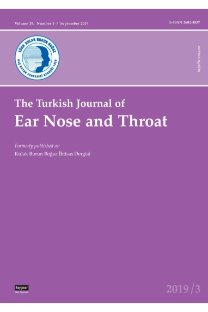Prenatal dönemde ekzojen glukokortikoid ve stres maruziyeti iç kulağı etkileyebilir
Kafeik asit fenetil ester, gecikmiş etki, glukokortikoid, işitme, perinatal maruziyet
Prenatally exposure to exogenous glucocorticoids and stress may affect the inner ear
- ISSN: 2602-4837
- Yayın Aralığı: Yılda 4 Sayı
- Başlangıç: 1991
- Yayıncı: İstanbul Üniversitesi
Prenatal dönemde ekzojen glukokortikoid ve stres maruziyeti iç kulağı etkileyebilir
Öner SAKALLIOĞLU, Şinasi YALÇIN, Hatice Banu ÖZEL, Neriman ÇOLAKOĞLU, Hayrettin Cengiz ALPAY
Tonsillektomi esnasında saptanan internal karotis arter aşırı kıvrımı: İki olgu sunumu
Levent GÜRBÜZLER, Ahmet EYİBİLEN, İbrahim ALADAĞ
Mustafa SAĞIT, Ferhat KORKMAZ, Mehmet YAŞAR, Mehmet Akif SOMDAŞ, İbrahim ÖZCAN
Tiroid hemiangenez, nodüler guatr ve papiller karsinom birlikteliği
Gülden YENİCE KARATAĞ, Zeynep KIRKALİ ALBAYRAK, Hülya KAPRAN ÖNAY, Ozan KARATAĞ, Önder PEKER
Yumuşak damak leiyomiyosarkomu
Ömer SAĞLAM, Samet Vasfi KUVAT, Ümit TAŞKIN, Alper YILDIRIM, Emre HOCAOĞLU
Beldan POLAT, Bora BAŞARAN, Halide ÇETİN KARA, Ahmet ATAŞ, Yusufhan SÜOĞLU
Yeniden yapılan tiroid cerrahisinin morbiditesi üzerinde ilk yapılan tiroid cerrahisinin etkisi
Özgür TARKAN, Levent SOYLU, Barlas AYDOĞAN, Özgür SÜRMELİOĞLU, Süleyman ÖZDEMİR, Ülkü TUNCER, Erdinç ÇEKİÇ
